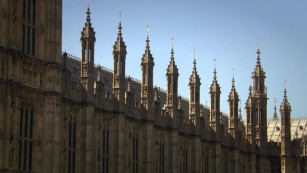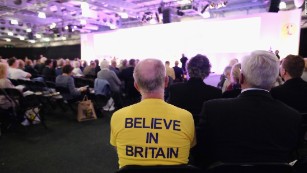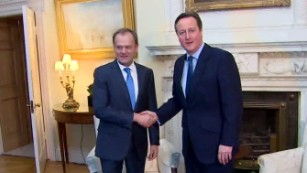Cameron calls British referendum on UK's EU membership for June 23
Now the campaign for the future of Britain, the argument over its place in the world, really begins. The day of decision is just four months away.
Once the seat of a global empire on which, as it was said, the sun never set, the United Kingdom faces a stark choice: whether to continue to participate in the grand experiment called the European Union, or whether, in a sense, to pull up the drawbridge and stay home.
During marathon meetings in Belgium this week, British Prime Minister David Cameron wrung concessions from the reluctant leaders of the EU's 27 other countries. His country will have special status in the EU. If it stay in the EU at all.
Britain, it is now understood by all, will never commit to "ever closer union," which has been the central goal of the EU and its predecessor organizations for decades. And it will not have to give child-tax credits or other financial aid to European Union citizens in financial distress for the first seven years, even when they come from other EU countries.
So Cameron has won his country special status within the European Union. Now he has called a referendum for Thursday, June 23, to give voters the chance the Labor Party long denied them -- to go the the voting booth and, should that be their desire, tell the EU to shove it.
The choice facing UK voters will be whether to have outsized global influence in situations such as those in Ukraine or Iran, by participating in a huge international organization, or whether or to go it alone, and retain a greater degree of sovereignty than participation an organization like the EU allows.
Cameron made it clear Saturday that he wanted Britain to remain in the European Union.
Cameron to campaign for UK to remain in EU
"Leaving Europe would threaten our economic and national security," he said. He pledged to campaign to persuade British voters to approve continued participation in the wake of his negotiations.
And George Osborne, the country's chancellor of the Exchequer, or chief financial official, said that leaving the EU -- something he and the Prime Minister had recently been threatening to do, as they negotiated with other EU leaders -- would be "a huge leap in the dark" that carried grave risks.
But the deal and the referendum has split their Conservative Party, and some of Cameron's own appointees will campaign against him.
The most prominent Conservative opponent he will face over the coming weeks is Justice Secretary Michael Gove.
Gove said Saturday that Britain would be "freer, fairer and better off outside the EU," the BBC reported
He said his decision to defy the Prime Minister was the most difficult of his career.
But he said, as quoted on the BBC, that the EU had "proved a failure on so many fronts," and he felt compelled to put his political convictions before loyalty to Cameron..
A Cabinet divided
At least four other members of the Cabinet are deserting the Prime Minister on the issue.
Cameron had promised in 2013 that he would renegotiate the terms of the UK's participation in the EU, then return to the British people to allow them the final say as to whether the UK should stay in the EU or withdraw from it.

A British exit from the EU won't be cheap or easy 02:11
The agreement in Brussels late Friday came only after two days of tense talks with other EU leaders. Cameron said the EU provided the concessions he sought, including assurances that the other nations won't try to make Britain part of a "European superstate."
"There will be tough new restrictions on access to our welfare system for EU migrants," he said. "No more something for nothing. Britain will never join the euro, and we've secured vital protections for our economy and a full say over the rules of the free-trade single-market while remaining outside the euro."
World leaders praise deal
World leaders praised the deal, with German Chancellor Angela Merkel saying the EU leaders clearly wanted Britain to stay.
"We believe we have now given a package to David Cameron to elicit support in Britain for Britain remaining a member of the European Union," she said. "This was his goal after all. There was no doubt about it."

What is Brexit? 01:24
At the heart of the talks among the 28 EU heads of government were Britain's demands to play by special rules within the union. The demands left some EU leaders cold, but there was no great appetite to see a British exit from the EU -- or "Brexit," as it has come to be known.
A British departure would leave the EU diminished. It would lose its second-largest economy -- behind only that of Germany -- and one of its two members with permanent seats on the U.N. Security Council. (France holds the other.)
Cameron was upbeat at his news conference, saying, "our plan for Europe gives us the best of both worlds."
Britain will maintain full access to the EU's free-trade market and benefit from Europe-wide cooperation on crime and terrorism, he said.
But it will not have to cooperate in "the parts of Europe that don't work for us," such as the euro currency and eurozone bailouts, Cameron said.
Benefits to migrants a key issue
The EU sprang from the ashes of World War II as a free-trade zone. Its signal achievement has been to allow free movement of goods and people in the hope that economic integration would prevent a new continental war.
Britain opted out of both those EU provisions, and it views with skepticism the EU's effort to branch into new fields, regulating everything from pesticides to human rights, and creating a unified foreign policy, too.
Merkel said Britain's demand not to pay benefits to migrants from other EU countries had been a sticking point.
Cameron also wanted to opt out of the standard EU commitment that its members must work toward "ever closer union" -- a goal that has animated the European project for decades.
He wants Britain exempted from having to give various social benefits to newcomers -- even from other EU countries -- until they have lived in the UK for several years.
Past problems with the EU
Britain has resisted the envisaged "ever closer" ties with the EU. It is not a member of the Schengen Agreement, which allows passport-free travel among most European countries. And when many EU countries scrapped their national currencies in favor of the euro, Britain said it would stick with the pound.
The country's difficult relationship with the EU is nothing new. In the 1960s, French President Charles de Gaulle not only opposed Britain's entry into what was then called the Common Market, he also opposed any negotiations on the topic.

Will Britain stay in the EU?02:29
Britain didn't join the European Community, as it was then called, until 1973, by which time de Gaulle was dead.
There's no assurance the British people will approve the referendum.
The historic number of people fleeing conflict and poverty in the Middle East and North Africa -- most of them bound for Europe -- increases the chances that Britons, fearful about their jobs and their national identity, will try to pull up the drawbridge and go it alone.
For his part, U.S. President Barack Obama had urged Britain to stay in the EU. The UK as a member of the EU "gives us much greater confidence about the strength of the trans-Atlantic union," Obama said in July.
Donald Tusk, president of the European Council, said the agreement doesn't compromise "our fundamental values."
"I deeply believe that the United Kingdom needs Europe and Europe needs the United Kingdom," Tusk said. "To break the link now would be totally against our mutual interest. We have done all we could not to let that happen. But the final decision is in the hands of the British people."
Belgian Prime Minister Charles Michel tweeted: "We overcame our differences to reach a good #agreement. Now up to British people to decide. Good luck @David_Cameron."
News Courtesy: www.cnn.com











